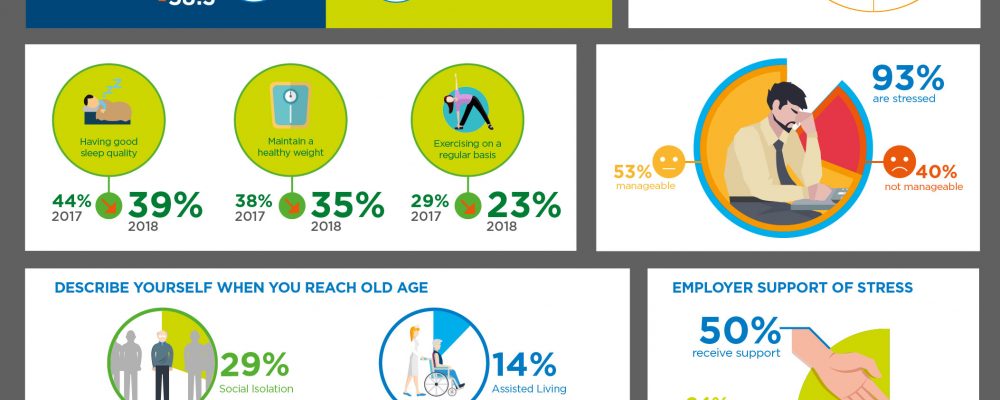Cigna Corporation’s (NYSE:CI) business in the Middle East today launched the results of its 2018 Cigna 360o Well-Being Survey – Future Assured. Factoring in the responses of the resident UAE population for the second consecutive year, the findings indicate that overall well-being remains stable with residents more confident of their ability to manage current and future costs, and the majority confirming a good work-life balance.
Now in its fourth year, the survey adopted a more forward-looking approach to exploring people’s perceptions and concerns for their health and their sense of well-being across five key areas – physical, family, social, finance and work. This year’s survey is Cigna’s most global to date with the addition of 10 nations to total 23 countries and territories in all.
The UAE experienced a marginal decline in overall wellness during the past year, dropping 1.6 points from 63.1 to 61.5, while still ranking higher than the global average and countries such as the UK, France, and Singapore. The slight decline was primarily driven by people having less personal time and concerns about meeting the needs of family members.
Physical well-being also diminished slightly since the 2017 survey with the sharpest decline observed in the ability to exercise regularly. Only 23 percent of respondents reported that they exercise on a regular basis compared to 29 percent in 2017, while 45 percent said they get sufficient sleep compared to 49 percent the previous year.
Opportunity for Employers to Increase Workplace Wellness
Workplace wellness programs are crucial for employees in the UAE, with 81 percent of the respondents agreeing that such initiatives are important in choosing between two potential employers. Notably, this finding peaks to 85 percent among the millennials.
The survey findings further hint at a lower incidence of employer support, with three in five respondents saying that they do not have any formal workplace wellness program in place, and half of them claiming they do not receive adequate support from employers in dealing with stress.
“More people are feeling positive about their current financial situation and understand the need to prepare for their future. However, our findings also show a trade-off as we face increased levels of workplace stress today,” said Art Cozad, Chief Executive Officer, Cigna Insurance Middle East. “This presents a huge opportunity for employers to step up their workplace wellness efforts. The UAE Government has already taken the lead in this respect through the innovative Happiness Agenda that is setting a benchmark for countries around the world. Following their example, private sector companies can offer practical solutions such as flexi-hours or stress management support through insurance packages that include mental wellness.”
Gearing up for old age
When it comes to ageing, one in two respondents foresee themselves being financially independent in their old age, and three in five believe they will continue to lead an active life both physically and socially. However, with only 20 percent of respondents expecting to have health insurance coverage in their old age, a majority plan to dip into savings to finance medical expenses.
Most respondents (47 percent) believe they will be taken care of by their partner or spouse, while another 27 percent say they look to their children for support rather than turning to professional caregivers for help.
Private healthcare is preferred choice
The survey indicates a high preference for private healthcare in the UAE, rating it better than public healthcare on most aspects. In contrast to most other markets in the study, private healthcare is not perceived to be that much costlier than the public system.
People in the UAE are also highly open to health data sharing (76 percent) with third parties if it lowers healthcare costs, provides better access to healthcare, and enables early detection of illness.
“While the UAE is at the forefront of quality healthcare, there are clear gaps in accessibility to treatment owing to various factors, from the lack of employee benefits to poor health and well-being behavior among residents. With greater awareness and early intervention, these issues can be mitigated, leading to a healthier and more productive population,” Cozad concluded.
Drawing on 14,467 online interviews, including 502 in the UAE, the 2018 Cigna 360° Well-Being Survey was conducted from February to March 2018 across 23 countries and territories. The survey results can be downloaded here.





